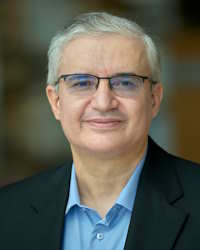KEYNOTE 1: Mohamed-Slim Alouini, KAUST, Saudi Arabia
Date: Monday, 24th June
TITLE
Towards Connecting the Remaining 3 Billion
ABSTRACT
The transformative influence of Internet and Communication Technology (ICT) has reshaped society, touching every aspect from the economy to healthcare. As the widespread deployment of 5G continues, there is an on-going focus on the inception of the sixth generation (6G) of wireless communication systems (WCSs). Anticipated to shape the future of connectivity in the 2030s, 6G aims to deliver unparalleled communication services to meet the demands of hyper-connectivity.
While densely populated urban areas have traditionally been the primary beneficiaries of WCS advancements, the vision for 6G transcends city limits. Aligned with the United Nations' sustainability goals for 2030, an important aspect of 6G endeavors to democratize the benefits of ICT, fostering global connectivity sustainably.
This talk delves into this particular envisioned landscape of 6G, providing insights into the future of wireless communication and guiding research efforts towards sustainable, inclusive, and high-speed connectivity solutions for the future. Central to this discussion are two emerging technologies: Free Space Optics (FSO) and Non-Terrestrial Networks (NTN). These innovative solutions hold the promise of extending high-speed connectivity beyond urban hubs to underserved regions, fostering digital inclusivity and contributing to the development of remote areas. Through this exploration, we aim to convey the potential of 6G and its role in shaping a connected, sustainable future for all.
BIOGRAPHY
 Mohamed-Slim Alouini was born in Tunis, Tunisia. He received the Ph.D. degree in Electrical Engineering from the California Institute of Technology (Caltech) in 1998. He served as a faculty member at the University of Minnesota then in the Texas A&M University at Qatar before joining in 2009 the King Abdullah University of Science and Technology (KAUST) where he is now the Al Khawarizmi Distinguished Professor of Electrical and Computer Engineering. Prof. Alouini is a Fellow of the IEEE and OPTICA (Formerly the Optical Society of America (OSA)). He is currently particularly interested in addressing the technical challenges associated with the uneven distribution, access to, and use of information and communication technologies in rural, low-income, disaster, and/or hard-to-reach areas.
Mohamed-Slim Alouini was born in Tunis, Tunisia. He received the Ph.D. degree in Electrical Engineering from the California Institute of Technology (Caltech) in 1998. He served as a faculty member at the University of Minnesota then in the Texas A&M University at Qatar before joining in 2009 the King Abdullah University of Science and Technology (KAUST) where he is now the Al Khawarizmi Distinguished Professor of Electrical and Computer Engineering. Prof. Alouini is a Fellow of the IEEE and OPTICA (Formerly the Optical Society of America (OSA)). He is currently particularly interested in addressing the technical challenges associated with the uneven distribution, access to, and use of information and communication technologies in rural, low-income, disaster, and/or hard-to-reach areas.


